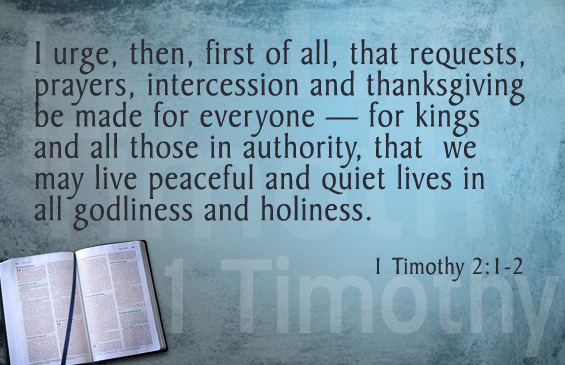In chapter two, Paul begins with a brief exhortation on the necessity of prayer. His use of the word “then” or “therefore” relates this directly back to the previous discussion on false teachers. But his use of the phrase “first of all” conveys the primacy of prayer in a believers life.
He gives us a lot of information in these two verses. Take a look at 1 Timothy 2:1-2:

Prayer is an essential part of the Christian’s life. And Paul stresses that fact with his words to Timothy here. Prayer is to be his focus, and ours. For Timothy, this directive follows the discussion on false teachers. So Timothy knew right away who to be praying for, among others.
The principles found here also provide a sort of manual for worship for the early church. In fact, there are several striking similarities here that can be seen in the writing of other early church fathers, such as Clement and others, indicating that these ideas were very widely used.
First of all, Paul uses four different words for prayer. Three of these are very similar, and the differences are subtle. Paul may not have had in mind these differences; he may have used the repetition as a means of emphasis. Prayer is important!
Let’s take a brief look at Paul’s teaching on prayer.
The four kinds of prayer
- Requests – The Greek word here indicates asking for a specific need. Prayer is an expression of our needs, both our physical needs and our need for the gifts and blessing of God.
- Prayers – This is a more general term for prayer. Many of its uses imply a sense of worship and reverence, in our coming to God with our needs.
- Intercession – Paul only uses this word here. There are no other instances of it in his writings. The idea behind this word is “petition.” Intercession implies pleading on behalf of others, and this is not exactly what the Greek word means. This is more of a confident, familiar form of prayer, like the free access of childlike confidence.
- Thanksgiving – While the first three words indicate requests made of God, this fourth word refers to gratitude toward God. God has bestowed many undeserved blessings upon us, for which each of us should be thankful.
The two objects of prayer
- For everyone – Literally, Paul is telling us to pray for all human beings. Even though the false teachers have made it difficult for the church in Ephesus, they still are in need of Timothy’s prayers. These teachers, and all other people, were to be the target of Timothy’s prayers.
- For kings and those in authority – Paul singles out one group who especially need our prayers: those in authority. Elsewhere, Paul states that all authorities are given the right to rule by God himself (Romans 13), and as such, they are in dire need of our prayers. It’s significant that Paul mentions a group that could be the most easily hated by Christians. Timothy and Paul were living in the fierce times of such leaders as Nero and others who hated Christianity. Believers fearing these leaders could easily refuse to pray for them. The same is true for us. Regardless of your opinions of the current political administration, our leaders desperately need our prayers. We can’t neglect this.
The four reasons for prayer
- Peaceful and quiet lives – Paul does not expect that believers will be free from persecution or troubles because of their faith, and neither should we. But praying for our leaders provides the means for God to work continuously in their lives, and in ours. If our lives are at peace and full of the blessings of God, then those blessing spill out into the lives of those we come into contact with as well. Also, the false teachers that Paul has been referring to may have been stirring up dispute and unrest, and causing the church to be viewed negatively. Living peaceful and quiet lives prevented the church from being seen in such a way (see 1 Timothy 6:1).
- Godliness – This is a central theme running through 1 and 2 Timothy and Titus. This term describes our attitude and conduct as measured by God’s standard. The idea here is piety, living life in such a way that it displays our reverence for God.
- Holiness – This refers to proper conduct. This is the part of our lives that is seen by others, especially by those outside the church. When they see that we live lives of respect, dignity and reverence, they may be drawn to us, and through us, to God. This is the same root word used by Paul in Philippians 4:8 that we translate as “noble.”
And so we see, in just a few sentences, a major directive by Paul for Timothy to pray. And, by extension, for us to pray.
Prayer is an essential part of the believer’s life. Without it, our connection with God is distant and broken. But with it comes freshness to our spiritual lives. Here, Paul gives us a clear mandate of how to pray, who to pray for, and why.
What are we waiting for?
Do you incorporate any of these ideas into your prayers? If so, which ones, and how? You can leave your thoughts in the comments section below.
